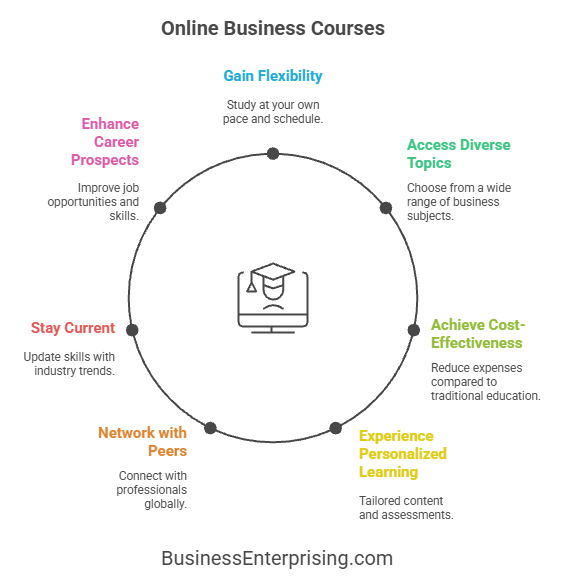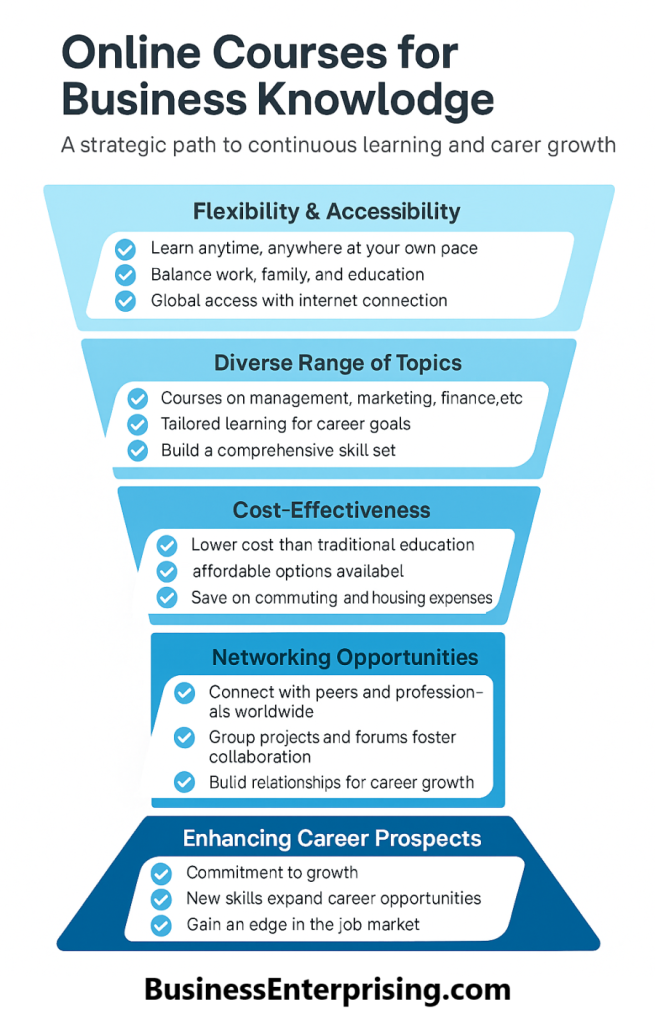
Flexibility and Accessibility
One of the most significant advantages of using online courses for business knowledge is their flexibility. Unlike traditional classroom settings, online courses allow learners to study at their own pace and on their own schedule. This flexibility is particularly beneficial for busy professionals who need to balance work, family, and other commitments. By providing the option to access course materials anytime and anywhere, online courses make it easier to pursue continuous education.
Additionally, online courses are accessible to a global audience, breaking down geographical barriers that often limit access to quality education. As long as you have an internet connection, you can access world-class business education. This accessibility democratizes learning opportunities, enabling a diverse range of individuals to acquire valuable business skills and knowledge.
Diverse Range of Topics
Online courses cover a vast array of business-related topics, catering to various interests and professional needs. From business funding to operational efficiency, there is something for everyone. This diversity allows learners to tailor their education to their specific career goals and interests.
For instance, a marketing professional looking to enhance their digital marketing skills can find courses on SEO, social media marketing, and content strategy. Similarly, an aspiring entrepreneur can access courses on business planning, startup funding, and growth strategies. By offering such a wide range of topics, online courses provide learners with the opportunity to build a comprehensive skill set that is relevant to their career path.
Cost-Effectiveness
Online courses are often more cost-effective than traditional education programs. Many reputable institutions and platforms offer free or affordable courses, making high-quality business education accessible to a broader audience. Additionally, the absence of commuting and accommodation costs further reduces the overall expense of pursuing education online.
This cost-effectiveness is particularly advantageous for small business owners and entrepreneurs who may have limited budgets for professional development. By investing in online courses, they can gain valuable insights and skills that can drive business growth without incurring significant costs. Furthermore, companies can leverage online courses to provide cost-effective training and development opportunities for their employees, enhancing organizational capabilities and performance.
Personalized Learning Experience
Online courses often incorporate advanced learning technologies that provide a personalized learning experience. Adaptive learning platforms, for example, use data analytics to tailor course content and assessments to individual learners’ needs and progress. This personalized approach ensures that learners can focus on areas where they need improvement, enhancing the overall effectiveness of the learning process.
Moreover, many online courses offer interactive elements such as quizzes, simulations, and discussion forums, which engage learners and promote active participation. These features allow learners to apply theoretical concepts to real-world scenarios, reinforcing their understanding and retention of the material. By providing a personalized and interactive learning experience, online courses can significantly enhance knowledge acquisition and skill development.
Networking Opportunities
While online courses are often perceived as solitary endeavors, many platforms and institutions incorporate networking opportunities into their programs. Discussion forums, group projects, and live webinars enable learners to connect with peers, instructors, and industry professionals from around the world. These interactions can lead to valuable networking opportunities, fostering collaboration, and knowledge sharing.
For instance, participating in an online course on global business strategy might connect you with professionals from different countries, providing diverse perspectives and insights. Networking with peers who share similar interests and career goals can also lead to potential collaborations and partnerships. By facilitating these connections, online courses create a supportive learning community that extends beyond the virtual classroom.
Staying Current with Industry Trends
The business landscape is constantly evolving, driven by technological advancements, market shifts, and changing consumer behaviors. Staying current with these trends is essential for maintaining a competitive edge. Online courses are often updated regularly to reflect the latest developments and best practices in the industry. This ensures that learners are equipped with up-to-date knowledge and skills that are relevant to the current business environment.
For example, courses on digital transformation may include the latest tools and technologies used in the industry, while courses on leadership might cover emerging trends in organizational behavior and management. By staying current with industry trends through online courses, professionals can anticipate changes, adapt their strategies, and drive innovation within their organizations.
Enhancing Career Prospects
Gaining business knowledge through online courses can significantly enhance career prospects. Completing reputable courses and earning certifications demonstrates a commitment to continuous learning and professional development. This can make a positive impression on employers and increase your competitiveness in the job market.
Furthermore, acquiring new skills and knowledge can open up new career opportunities and pathways. For example, a professional with a background in finance might take courses in data analytics and transition into a role that combines financial expertise with data-driven decision-making. By expanding their skill set through online courses, individuals can pursue diverse career opportunities and achieve their professional goals.
Conclusion
Online courses offer a flexible, accessible, and cost-effective way to gain business knowledge and skills. By providing a diverse range of topics, personalized learning experiences, and networking opportunities, these courses cater to the needs of professionals at all stages of their careers. Staying current with industry trends and enhancing career prospects through online education can drive personal and organizational growth.
In conclusion, leveraging online courses for business knowledge is a strategic investment in professional development. As the business landscape continues to evolve, the ability to adapt and acquire new skills will be crucial for success. By embracing the opportunities offered by online courses, professionals can stay ahead of the curve, enhance their capabilities, and achieve their career aspirations. As technology continues to advance, the scope and quality of online education will only improve, making it an indispensable resource for lifelong learning and growth.


